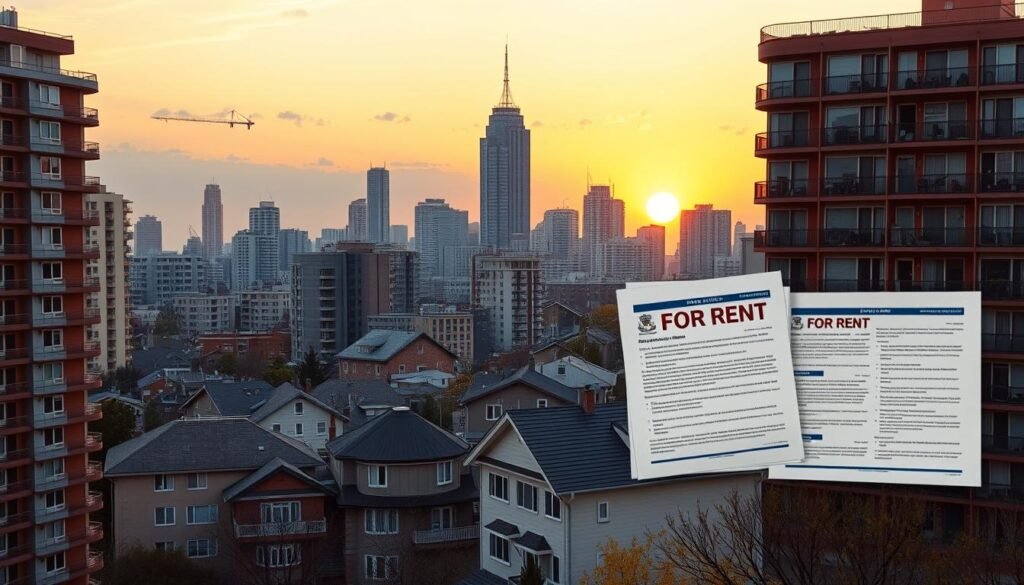As the popularity of Airbnb continues to grow globally, cities worldwide are grappling with the impact of short-term rentals on their communities. With the rise of home-sharing platforms, many urban centers are now implementing stricter regulations to address concerns over housing affordability, neighborhood disruption, and the need to balance the interests of residents, tourists, and the tech-driven hospitality industry.
This article explores the evolving landscape of urban regulations and their implications for Airbnb’s business model, the experiences of its hosts and guests, and the broader implications for the future of the short-term rental market. By delving into the complex interplay between technology, tourism, and local policymaking, we aim to provide a comprehensive understanding of the challenges and opportunities facing Airbnb as it navigates this rapidly changing regulatory environment.
Key Takeaways
- Cities worldwide are implementing stricter regulations on short-term rentals like Airbnb to address concerns over housing affordability and neighborhood disruption.
- Airbnb faces significant legal and operational challenges as it adapts to these new urban regulations, which impact its business model, hosts, and guests.
- The future of Airbnb will depend on its ability to collaborate with local authorities, enhance compliance measures, and develop innovative strategies to address the needs of both communities and travelers.
- Data and analytics will play a crucial role in helping Airbnb and policymakers navigate the evolving regulatory landscape and make informed decisions.
- The success of Airbnb in the face of new urban regulations will have far-reaching implications for the short-term rental industry and the future of travel accommodation.
Overview of Urban Regulations Impacting Short-Term Rentals
As the Airbnb legal challenges and vacation rental restrictions continue to shape the landscape of the short-term rental industry, it is crucial for hosts to understand the evolving regulatory environment. Urban housing policies play a significant role in defining the parameters within which Airbnb and similar platforms can operate.
Definition of Short-Term Rentals
Short-term rentals refer to the temporary leasing of residential properties, often for periods of less than 30 days. These rentals have become increasingly popular among travelers seeking alternatives to traditional hotel accommodations, and they have also presented new opportunities for homeowners to generate additional income.
Recent Trends in Urban Regulation
In recent years, many cities have implemented stricter vacation rental restrictions in response to concerns over the impact of short-term rentals on urban housing policies. These regulations often include requirements for host registration, limits on the number of days a property can be rented, and zoning restrictions on where short-term rentals are permitted.
Importance of Compliance for Hosts
Compliance with local regulations is crucial for Airbnb hosts, as failure to do so can result in fines, legal action, and even the suspension of their rental listings. Hosts must stay informed about the latest Airbnb legal challenges and regulatory changes in their area to ensure they are operating within the bounds of the law.
“As the short-term rental industry continues to evolve, it is essential for Airbnb hosts to prioritize compliance with local regulations to protect their businesses and ensure a positive guest experience.”
Historical Context of Airbnb and Regulations
Airbnb’s rise as a leading player in the short-term rental market has been accompanied by a complex regulatory landscape. The company’s evolution from a simple bedroom-sharing platform to a global hospitality powerhouse has challenged traditional tourism accommodation rules and residential zoning laws. Understanding this historical context is crucial to navigating the future of Airbnb in a regulated world.
Evolution of Airbnb's Business Model
Airbnb was founded in 2008 as a modest platform for individuals to rent out spare rooms or entire homes to travelers. As the company grew, its business model expanded to include a wider range of short-term rental properties, often in residential areas not zoned for commercial use. This rapid expansion brought Airbnb into conflict with local governments seeking to maintain control over housing and tourism.
Key Legal Challenges Faced by Airbnb
Airbnb has faced a range of legal challenges related to its Airbnb regulatory compliance, particularly in major cities where tourism accommodation rules and residential zoning laws have been tightened. From licensing requirements and tax obligations to restrictions on the number of rental days, Airbnb has had to adapt its operations to comply with an evolving regulatory landscape.
Comparison with Traditional Lodging
Unlike traditional hotels and motels, which operate within well-established regulatory frameworks, Airbnb’s short-term rental model has often fallen into a gray area of the law. This has led to comparisons between Airbnb and other forms of lodging, with policymakers and community groups debating the appropriate level of oversight and regulation for this new industry.
| Airbnb | Traditional Lodging |
|---|---|
| Decentralized, peer-to-peer platform | Centralized, commercial operations |
| Residential properties used for short-term rentals | Dedicated commercial properties for lodging |
| Less regulated, often operating in legal gray areas | Heavily regulated, with established compliance frameworks |

As Airbnb continues to navigate this evolving regulatory landscape, understanding the historical context of its business model and the key legal challenges it has faced will be crucial in shaping the future of the company and the short-term rental industry as a whole.
Major Cities Implementing Stricter Regulations
As the home-sharing economy continues to disrupt the traditional lodging industry, local governments around the world are stepping up to address the challenges posed by short-term rental platforms like Airbnb. Several major cities have implemented stricter local government ordinances and short-term rental laws to regulate the burgeoning industry.
San Francisco: A Regulatory Case Study
San Francisco, one of the first cities to grapple with the rise of Airbnb, has taken a multi-faceted approach to home-sharing regulations. The city’s short-term rental laws require hosts to register with the city, limit the number of days a property can be rented, and impose fines for non-compliance. This regulatory framework has aimed to balance the economic benefits of the home-sharing industry with the needs of the local community.
New York City: Compliance and Challenges
New York City has also implemented strict local government ordinances for short-term rentals, with hosts required to obtain a license and comply with a range of rules. However, enforcing these home-sharing regulations has proven challenging, as the city continues to battle illegal listings and unlicensed rentals. Airbnb has faced legal battles with the city over data-sharing and other compliance issues.
European Cities Taking Action
- Amsterdam has introduced a 30-night cap on short-term rentals and requires hosts to register their properties.
- Paris has implemented a 120-night limit and mandates that hosts register their properties and collect tourist taxes.
- Barcelona has banned new short-term rental licenses in certain neighborhoods, aiming to preserve the character of the city.
These European cities’ approaches to regulating the home-sharing industry serve as examples of how local government ordinances can shape the future of Airbnb and similar platforms in urban areas.

| City | Short-Term Rental Regulations | Key Highlights |
|---|---|---|
| San Francisco | Mandatory host registration, limits on rental days, fines for non-compliance | Balancing economic benefits with community needs |
| New York City | Mandatory host licensing, compliance challenges with illegal listings | Ongoing legal battles with Airbnb over data-sharing and regulations |
| Amsterdam | 30-night rental cap, mandatory host registration | Preserving city character through short-term rental limits |
| Paris | 120-night rental limit, mandatory host registration and tourist tax collection | Balancing tourism and residential needs |
| Barcelona | Ban on new short-term rental licenses in certain neighborhoods | Preserving the character of the city through targeted regulations |
As the home-sharing industry continues to evolve, these major cities serve as prime examples of how local government ordinances, short-term rental laws, and targeted regulations can shape the future of Airbnb and similar platforms in urban areas.
The Role of Local Governments
As the short-term rental industry continues to evolve, local governments have taken a more active role in shaping the regulatory landscape. These governing bodies face the challenging task of balancing the needs of their communities with the economic benefits that Airbnb and similar platforms can bring.
Balancing Community Needs and Economic Growth
Local governments must navigate the delicate balance between addressing concerns over urban housing policies and preserving the potential for economic growth through Airbnb regulatory compliance. This often involves engaging with a diverse range of stakeholders, including residents, landlords, and the Airbnb host community, to find sustainable solutions.
Engaging Stakeholders in Regulation Discussion
Effective local government ordinances require a collaborative approach that incorporates the perspectives of all affected parties. By fostering open dialogues and gathering comprehensive feedback, policymakers can develop regulations that address community concerns while still allowing for the economic benefits of short-term rentals.
Developing Sustainable Policies
The ultimate goal for local governments is to create urban housing policies that are sustainable in the long term. This may involve striking a balance between Airbnb regulatory compliance and preserving the availability of affordable housing, or implementing local government ordinances that promote responsible hosting practices.
“The future of Airbnb in urban areas will be shaped by the ability of local governments to develop regulations that address the unique needs and concerns of their communities.”

As the Airbnb model continues to disrupt traditional lodging, the role of local governments will only become more critical in determining the future of short-term rentals in urban areas.
Airbnb's Response to Regulation Changes
As urban centers around the world implement stricter regulations on short-term rentals, Airbnb has been proactive in adapting its business strategies to navigate this evolving landscape. The future of [https://sociosbnb.com/boost-your-airbnb-local-seo-strategies-that-work/] Airbnb in the face of new urban regulations requires a multifaceted approach, and the company has taken steps to enhance host support services and collaborate with local authorities to ensure [Airbnb regulatory compliance].
Adapting Business Strategies
Recognizing the [Airbnb legal challenges] posed by new regulations, Airbnb has made significant changes to its business model. The company has worked to improve [Airbnb regulatory compliance] by implementing stricter host verification processes, enhancing transparency around listing requirements, and developing tools to help hosts navigate the complex regulatory landscape.
Enhancing Host Support Services
Airbnb has also placed a greater emphasis on supporting its host community. The company has invested in educational resources, legal guidance, and technical assistance to help hosts understand and comply with local regulations. This support has been crucial in empowering hosts to continue offering their properties while navigating the [the future of Airbnb in the face of new urban regulations].
Collaborating with Local Authorities
In addition to internal adjustments, Airbnb has sought to forge partnerships with local governments and authorities. The company has engaged in dialogue with policymakers, sharing data and insights to help inform the development of sustainable short-term rental policies. This collaborative approach aims to balance the needs of communities with the economic benefits that [Airbnb regulatory compliance] can provide.

As the [the future of Airbnb in the face of new urban regulations] continues to evolve, Airbnb’s adaptability and commitment to working with local stakeholders will be crucial in ensuring the platform’s long-term viability and success.
The Effect of Regulations on Hosts
As short-term rental laws and home-sharing regulations continue to evolve across the globe, Airbnb hosts are feeling the impact on their operations. The financial implications, changing market dynamics, and strategies for compliance are crucial considerations for these entrepreneurs navigating the increasingly complex vacation rental landscape.
Financial Implications for Hosts
Stricter short-term rental laws and home-sharing regulations have led to increased costs for Airbnb hosts. From acquiring necessary licenses and permits to adhering to occupancy limits and other compliance requirements, hosts are finding their profit margins squeezed. In some cases, vacation rental restrictions have even forced hosts to exit the market altogether, unable to sustain their businesses under the new rules.
Changing Market Dynamics
The implementation of short-term rental laws has significantly altered the competitive landscape for Airbnb hosts. With fewer properties available due to regulatory constraints, hosts are facing heightened competition for a dwindling pool of guests. This shift in market dynamics has forced hosts to re-evaluate their pricing strategies, amenities, and customer service to stand out in an increasingly crowded field.
Strategies for Compliance
- Familiarize themselves with the latest home-sharing regulations in their area
- Obtain necessary licenses and permits to operate legally
- Implement robust systems to track occupancy and ensure compliance with rules
- Communicate openly with guests about the impact of regulations on their stay
- Explore alternative revenue streams, such as longer-term rentals, to diversify their business
As the landscape of short-term rentals continues to evolve, Airbnb hosts must navigate these challenging waters with agility and resilience. By understanding the financial implications, adapting to changing market dynamics, and proactively complying with regulations, hosts can position themselves for success in the face of an increasingly complex regulatory environment.

Impact on Guests Seeking Short-Term Rentals
As urban authorities implement stricter regulations on tourism accommodation, guests seeking short-term rentals through platforms like Airbnb are facing a changing landscape. The impact of these regulations is felt in the availability and pricing of rentals, as well as adjustments to the overall guest experience.
Availability and Pricing of Rentals
With new tourism accommodation rules and vacation rental restrictions in place, the inventory of available short-term rentals has seen a decline in some markets. Hosts who are unable or unwilling to comply with the Airbnb regulatory compliance requirements may choose to exit the market, reducing the options for guests. Additionally, rental prices may rise as hosts pass on the costs of meeting regulatory standards to their guests.
Adjustments in Guest Experience
The guest experience in short-term rentals is also evolving due to the new regulations. Guests may encounter more standardized check-in and check-out procedures, as well as increased transparency around the legal status of the rental property. Additionally, some amenities or services that were previously offered may be reduced or eliminated as hosts focus on ensuring Airbnb regulatory compliance.
Understanding New Booking Processes
As the short-term rental industry adapts to the changing regulatory environment, guests must navigate new booking processes. This may include providing additional information during the booking process, such as verifying their identity or agreeing to certain terms and conditions. Guests may also need to familiarize themselves with local tourism accommodation rules and vacation rental restrictions to ensure a seamless and compliant experience.
| Aspect | Impact on Guests |
|---|---|
| Rental Availability | Reduced inventory due to host compliance issues |
| Rental Pricing | Increased prices as hosts pass on regulatory costs |
| Guest Experience | More standardized check-in/check-out, reduced amenities |
| Booking Process | Additional information and compliance requirements |
As the short-term rental industry continues to evolve, guests must adapt to the changing landscape of tourism accommodation rules, Airbnb regulatory compliance, and vacation rental restrictions. By understanding these changes, guests can navigate the short-term rental market more effectively and have a more seamless experience.

The Future of Airbnb's Business Model
As Airbnb navigates the ever-changing landscape of short-term rental laws and home-sharing regulations, the company is exploring new ways to adapt and thrive. One key focus is diversifying its revenue streams beyond the traditional vacation rental model.
Exploring New Revenue Streams
In response to the future of Airbnb in the face of new urban regulations, the company is actively exploring additional revenue sources. This includes expanding its offerings to include longer-term stays, corporate housing, and even professional property management services for hosts.
Technological Innovations to Adapt
Airbnb is also investing heavily in technological innovations to streamline its operations and ensure compliance with evolving regulations. This includes developing advanced analytics tools to help hosts navigate short-term rental laws and implementing new verification systems to enhance trust and safety for guests.
Shifts Toward Longer Stays
Additionally, Airbnb is recognizing a growing trend toward longer-term stays, especially in the wake of the COVID-19 pandemic. By catering to this demand and offering more options for extended stays, the company hopes to maintain its relevance and appeal in the face of home-sharing regulations.
As Airbnb continues to adapt its business model, the future of the company will depend on its ability to balance innovation, regulatory compliance, and the evolving needs of both hosts and guests. The future of Airbnb in the face of new urban regulations will be a critical factor in shaping the company’s long-term success.

The Role of Technology in Compliance
As Airbnb and other short-term rental platforms navigate the increasingly complex landscape of urban housing policies and local government ordinances, technology has emerged as a critical tool for ensuring regulatory compliance. Airbnb is actively integrating advanced compliance tools, leveraging data analytics, and enhancing transparency to address the evolving needs of hosts and guests.
Integration of Regulatory Compliance Tools
Airbnb has invested heavily in developing and integrating regulatory compliance tools to help hosts navigate the web of local rules and regulations. These tools provide real-time updates on ordinances, automatic registration assistance, and streamlined reporting mechanisms. By empowering hosts with the right information and tools, Airbnb aims to simplify the compliance process and ensure that its platform aligns with urban housing policies and local government ordinances.
Data Analytics for Effective Monitoring
Leveraging the power of data analytics, Airbnb is able to closely monitor and track Airbnb regulatory compliance across its platform. Through advanced algorithms and data visualization, the company can identify potential compliance issues, flag problematic listings, and proactively address concerns raised by local authorities. This data-driven approach allows Airbnb to stay ahead of the curve and respond swiftly to evolving regulatory requirements.
Enhancing Transparency for Hosts and Guests
Recognizing the importance of transparency in building trust with both hosts and guests, Airbnb has implemented several initiatives to enhance visibility and clarity around compliance. This includes providing clear guidelines, educational resources, and real-time updates on regulatory changes. By empowering its community with the necessary information, Airbnb aims to foster a culture of responsible short-term rental practices and maintain positive relationships with local governments.
| Feature | Description | Impact |
|---|---|---|
| Compliance Tools | Integrated tools to help hosts navigate local regulations | Simplifies compliance process, ensures alignment with urban housing policies and local government ordinances |
| Data Analytics | Advanced algorithms to monitor and track Airbnb regulatory compliance | Proactive identification of issues, swift response to evolving requirements |
| Transparency Initiatives | Clear guidelines, educational resources, and real-time updates for hosts and guests | Builds trust, promotes responsible short-term rental practices, and maintains positive relationships with local authorities |
By leveraging technology in this multifaceted approach, Airbnb is well-positioned to navigate the ever-changing landscape of Airbnb regulatory compliance, addressing the concerns of urban housing policies and local government ordinances while delivering a seamless experience for its users.

Community Responses to Airbnb Regulations
As urban housing policies and residential zoning laws evolve to address the rise of short-term rentals, local communities have emerged as active stakeholders in shaping these regulatory landscapes. The public sentiment surrounding Airbnb and similar platforms has been a mix of excitement and concern, leading to a surge of grassroots activism and community-driven initiatives.
Public Sentiment and Activism
Across many cities, Airbnb’s expansion has sparked lively debates around the balance between economic growth and the preservation of residential neighborhoods. Vocal community groups have rallied to advocate for stricter local government ordinances, citing issues like housing affordability, neighborhood disruption, and the erosion of a sense of community.
These grassroots movements have taken various forms, from petitions and public demonstrations to direct engagement with policymakers. The goal is to ensure that the interests of local residents are adequately represented in the decision-making process surrounding urban housing policies and short-term rental regulations.
Case Studies of Successful Local Initiatives
In some cities, community-driven efforts have led to the implementation of innovative regulatory approaches. For example, in San Francisco, a coalition of neighborhood associations worked closely with the local government to develop a comprehensive registration system for short-term rentals, which aims to strike a balance between the needs of hosts, guests, and the wider community.
Similarly, in New York City, community groups have succeeded in pushing for stricter enforcement of existing laws, resulting in a crackdown on illegal short-term rental listings and a renewed focus on preserving long-term housing stock for local residents.
The Future of Community-Driven Regulations
As the debate over urban housing policies and short-term rentals continues, the role of community engagement is expected to grow in importance. Policymakers are increasingly recognizing the value of incorporating local perspectives and grassroots initiatives into the regulatory process, ensuring that the unique needs and concerns of individual neighborhoods are addressed.
Moving forward, the success of community-driven regulations will depend on the ability of local governments, Airbnb, and other stakeholders to establish transparent and collaborative frameworks for decision-making. By fostering open dialogues and finding common ground, the future of urban housing policies and short-term rental regulations may be shaped by the collective voice of empowered communities.
| City | Community Response | Regulatory Outcome |
|---|---|---|
| San Francisco | Neighborhood associations advocated for a comprehensive registration system | Balanced approach to short-term rentals, addressing host, guest, and community needs |
| New York City | Community groups pushed for stricter enforcement of existing laws | Crackdown on illegal short-term rental listings, focus on preserving long-term housing |

“The success of community-driven regulations will depend on the ability of local governments, Airbnb, and other stakeholders to establish transparent and collaborative frameworks for decision-making.”
The Global Perspective on Short-Term Rentals
As the impact of new urban regulations on the vacation rental industry continues to unfold, it’s essential to examine the global perspective on this dynamic market. From evolving tourism accommodation rules to increasingly restrictive vacation rental policies, the future of Airbnb and similar platforms is being shaped by a complex web of international regulations.
Trends in International Regulations
Across the globe, local governments are grappling with the challenge of regulating the short-term rental market. While some cities have embraced the economic benefits of vacation rentals, others have sought to impose strict limits on their operation. Understanding these international trends is crucial for understanding the future of the industry.
Lessons from Global Markets
A review of short-term rental regulations in various global markets can provide valuable insights for the industry’s path forward. From the successful collaborations between Airbnb and local authorities in some regions to the legal battles that have unfolded in others, these case studies offer lessons on navigating the complex landscape of tourism accommodation rules and vacation rental restrictions.
Airbnb's Strategy for International Markets
As the leading player in the short-term rental industry, Airbnb has had to adapt its business model to accommodate the diverse regulatory environments it faces around the world. Airbnb’s strategy for international markets will be a key factor in determining the future of the company and the broader vacation rental industry in the face of new urban regulations.
| Region | Regulatory Approach | Impact on Vacation Rentals |
|---|---|---|
| Europe | Stricter regulations, such as registration requirements and limits on the number of rental days | Reduced availability of short-term rentals, changes in pricing and guest experience |
| Asia-Pacific | Varied approaches, with some cities embracing vacation rentals and others imposing tight restrictions | Uneven impact on the industry, with some markets thriving while others face significant challenges |
| Latin America | Emerging regulatory frameworks, with a mix of supportive and restrictive policies | Potential for growth in vacation rentals, but also uncertainty as regulations continue to evolve |
As the global short-term rental market continues to evolve, understanding the international regulatory landscape and Airbnb’s strategic adaptations will be crucial for anticipating the future of the industry in the face of new urban regulations, tourism accommodation rules, and vacation rental restrictions.

Potential Legal Battles Ahead
As the short-term rental industry continues to evolve, Airbnb and its hosts face a growing number of legal due to ever-changing short-term rental laws and regulatory compliance requirements. This section explores the potential legal battles on the horizon and the strategies Airbnb must employ to manage these risks effectively.
Anticipating Future Court Cases
With local governments increasingly tightening their grip on Airbnb legal challenges, the company can expect to see a surge in court cases related to zoning, taxation, and licensing. Airbnb has already faced numerous legal battles in major cities, and experts predict this trend will only continue as municipalities seek to assert more control over the Airbnb regulatory compliance landscape.
Strategies for Risk Management
- Developing robust compliance programs to ensure Airbnb hosts adhere to local regulations
- Engaging with policymakers to shape legislation that balances the needs of communities and the sharing economy
- Investing in legal advocacy to defend Airbnb’s business model and the rights of its hosts
- Exploring alternative revenue streams to reduce reliance on short-term rentals and mitigate legal risks
The Role of Legal Advocacy
As the legal landscape for short-term rentals continues to evolve, Airbnb will need to rely heavily on its legal team and advocacy efforts to navigate the complexities. This may involve lobbying local governments, participating in public hearings, and even challenging unfavorable regulations through the courts. Airbnb’s ability to adapt and stay ahead of legal challenges will be crucial to its long-term success in the face of increasing regulation.

| Legal Challenge | Potential Impact | Airbnb’s Response |
|---|---|---|
| Zoning regulations | Restrictions on where short-term rentals can operate | Engaging with policymakers, exploring zoning variances |
| Taxation and licensing | Increased operational costs for hosts and Airbnb | Developing compliance programs, advocating for fair regulations |
| Discrimination and consumer protection | Lawsuits and reputational damage | Strengthening anti-discrimination policies, enhancing guest experience |
Impact on Housing Markets
The rise of home-sharing platforms, such as Airbnb, has sparked a heated debate over their impact on urban housing markets. As more homeowners and landlords turn to short-term rentals, concerns have been raised about the availability of long-term rental units and the potential influence on housing prices.
The Debate Over Housing Availability
Some critics argue that the proliferation of short-term rentals has reduced the number of properties available for long-term residents, contributing to housing shortages in major cities. Proponents, on the other hand, contend that home-sharing provides homeowners with additional income, which can be reinvested into the housing market. The ongoing debate highlights the need for policymakers to strike a balance between facilitating economic growth and ensuring the availability of affordable housing.
Long-Term vs. Short-Term Rentals
- Long-term rentals typically provide more stability and housing security for residents, but they may not generate the same level of income for property owners.
- Short-term rentals can be more lucrative for homeowners, but they can also reduce the supply of long-term rental units, potentially driving up prices.
- The shift towards short-term rentals has prompted some cities to implement urban housing policies and residential zoning laws to regulate the growth of home-sharing regulations.
Regulatory Influence on Housing Prices
The regulatory landscape surrounding short-term rentals has the potential to significantly impact housing prices. In some cities, stricter urban housing policies and residential zoning laws have led to a decrease in the availability of short-term rental units, which can drive up the cost of long-term housing. Conversely, more permissive home-sharing regulations may allow for greater income generation for property owners, potentially offsetting the impact on housing prices.
| Regulation Type | Impact on Housing Prices |
|---|---|
| Restrictive urban housing policies and residential zoning laws | Increased long-term housing costs |
| Permissive home-sharing regulations | Potential offset in housing prices |
As policymakers and stakeholders continue to navigate the complexities of the short-term rental market, understanding the nuanced relationship between regulations and housing prices will be crucial in developing sustainable and equitable urban housing policies.

The Importance of Data and Analytics
As the world of short-term rentals continues to evolve, data and analytics have emerged as critical tools for navigating the complex regulatory landscape. From Airbnb regulatory compliance to understanding the impact of urban housing policies and short-term rental laws, data analytics have become essential for short-term rental hosts and policymakers alike.
Utilizing Data for Regulatory Compliance
Regulatory compliance has become a top priority for Airbnb hosts and short-term rental operators. By leveraging data-driven insights, these individuals can better understand the ever-evolving rules and regulations governing their businesses, ensuring they remain compliant and avoid costly penalties. Data analytics can help identify trends, flag potential issues, and guide hosts in adapting their practices to stay ahead of the curve.
Understanding Market Trends through Data
Data analysis also plays a crucial role in understanding the broader market trends shaping the short-term rental industry. By studying factors such as occupancy rates, pricing fluctuations, and guest preferences, hosts can make more informed decisions about their properties and offerings. This data-driven approach enables them to stay competitive and responsive to the changing needs of the market.
The Future of Data-Driven Decisions
As the short-term rental industry continues to evolve, the importance of data and analytics will only grow. Policymakers and industry stakeholders will increasingly rely on data-driven insights to guide the development of sustainable urban housing policies and short-term rental laws. By embracing this data-driven approach, the industry can navigate the challenges of the future and ensure the long-term viability of short-term rentals in urban communities.

“Data is the foundation upon which the future of short-term rentals will be built. Those who harness its power will be well-positioned to thrive in this evolving landscape.”
Conclusion: Airbnb's Future in a Regulated Landscape
As the short-term rental industry continues to evolve, the future of Airbnb will be shaped by the dynamic landscape of urban regulations. This article has explored the complexities of navigating the legal and social challenges posed by the rise of home-sharing platforms. From the definition of short-term rentals to the implementation of stricter policies in major cities, the industry has grappled with balancing community needs and economic growth.
Summary of Key Insights
The analysis has revealed the crucial role of local governments in developing sustainable regulations, the adaptability of Airbnb’s business strategies, and the impact on hosts and guests. Additionally, the importance of technological innovations, data-driven decision-making, and community engagement in shaping the future of short-term rentals has been highlighted.
Final Thoughts on Adaptability
As the future of Airbnb in the face of new urban regulations remains uncertain, the home-sharing giant must demonstrate its ability to adapt and collaborate with policymakers. By embracing technological advancements, enhancing transparency, and fostering open dialogue with stakeholders, Airbnb can navigate the evolving regulatory landscape and cement its position within the hospitality industry.
Call to Action for Stakeholders
For Airbnb, hosts, guests, and local communities, the path forward requires a collective effort to find a balanced approach that preserves the benefits of home-sharing while addressing the legitimate concerns of urban residents. By working together, stakeholders can shape policies that foster innovation, ensure regulatory compliance, and maintain the vibrancy of neighborhoods across the globe.
FAQ
What are the key urban regulations impacting Airbnb and the short-term rental industry?
Cities around the world have been implementing stricter regulations on short-term rentals, including registration requirements, caps on the number of rental days, and zoning laws that limit where these rentals can operate. These regulations aim to address concerns about housing affordability, neighborhood disruption, and the impact of vacation rentals on local communities.
How have Airbnb and its hosts responded to these new regulations?
Airbnb has adapted its business strategies to comply with local regulations, such as integrating compliance tools, enhancing support for hosts, and collaborating with authorities. Hosts have also had to adjust, facing financial implications and changing market dynamics. Many are developing strategies to ensure they operate within the law.
What is the role of local governments in shaping short-term rental regulations?
Local governments play a crucial role in balancing the needs of their communities with the economic benefits of short-term rentals. They engage stakeholders, develop sustainable policies, and enforce regulations to address issues like housing affordability, neighborhood disruption, and the overall impact of vacation rentals.
How have Airbnb guests been affected by the new regulations?
Guests using Airbnb have experienced changes in rental availability and pricing, adjustments to the guest experience, and new booking processes as a result of regulatory compliance. They must navigate the evolving landscape of tourism accommodation rules and vacation rental restrictions.
What is the potential impact of regulations on Airbnb’s business model?
Airbnb is exploring new revenue streams, implementing technological innovations, and shifting towards longer-stay bookings to adapt to the changing regulatory environment. These changes aim to align Airbnb’s business model with evolving short-term rental laws and home-sharing regulations.
How is technology playing a role in Airbnb’s regulatory compliance efforts?
Airbnb is integrating regulatory compliance tools, using data analytics for effective monitoring, and enhancing transparency for hosts and guests. These technological solutions help the company address urban housing policy concerns and meet local government ordinance requirements.
What are the potential legal battles Airbnb may face in the future?
Airbnb may face further legal challenges as cities continue to refine and enforce short-term rental regulations. The company is anticipating future court cases and developing strategies for managing legal risks, while also advocating for policies that balance the interests of hosts, guests, and local communities.
How are short-term rentals impacting housing markets?
The growth of short-term rentals has reignited the debate over housing availability, with concerns that they are reducing the supply of long-term rental units and driving up housing prices in some markets. Regulatory efforts aim to address these issues and find a balance between short-term and long-term rental needs.
What is the importance of data and analytics in the future of short-term rentals?
Data and analytics play a crucial role in Airbnb’s regulatory compliance efforts, as well as in understanding market trends and making data-driven decisions. Effective use of data is shaping the development of urban housing policies and short-term rental laws.



